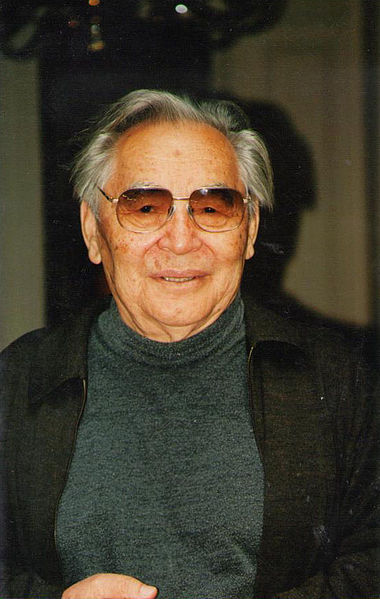“The People’s Writer of Kazakhstan””: An Interview with noted Kazakhstan Author Abdi-Jamil Nurpeisov
Share:

“To understand a writer you need to read his book. The book is more important and deeper than the writer himself,”the noted 89 year old Kazakhstan author Abdi-Jamil Nurpeisov explained to me in one of his rare interviews,in late May, at the Kazakhstan embassy in Washington, D.C.
His books, “Blood & Sweat” and “Final Respects”were recently published in English by a New York publishing company, Liberty Publishing House.
Ilya Levkov, the publisher of Liberty Publishing House who was born in Kazakhstan, commented to me at the author’s book reception at the Kazakhstan Embassy, that he sees these two books as “adventures” and that “the author gives us a view of Kazakhstan” rarely seen or read by Americans and other people in the West”.
Calling the author Abdi-Jamil Nurpeisov, “Mr. Kazakhstan” the Liberty Publishing House executive goes on to state, “Blood & Sweat tells of the birth of the nation of Kazakhstan. This book was originally a trilogy. It tells of nomadic and non-nomadic life of the country. The author is a canvas epic writer. The author tries to understand the relationship Kazakhstan has with Russia over the years. It is an epic story like War and Peace.”
The other book just published “Final Respects”, according to the publisher “is about two childhood friends who clash about the deterioration of the Aral Sea. Both men like the same girl. Book shows that we are all in this together and that man is not the master of nature.”
In our interview, the author, Abdi-Jamil Nurpesisov, related that the dying of the Aral Sea is “an ecological tragedy that touches all of us. What happens in one part of the planet affects all of us. There is a strong kinship with people of the world. There is a spiritual unity among all peoples in the world even if some deny the fact.”
The theme of his book “Final Respects” “is about people facing one of the world’s most devastating ecological disasters-the tragedy of the dying Aral Sea.”
Why did the Aral Sea start to die and what was the main cause of the destruction of this bountiful Sea, I asked the author. He replied, “Khrushchev considered himself an expert on agriculture. The USSR developed a cotton industry to bring in hard currency. The water was diverted from the Sea to help the cotton industry. It was a state decision to divert water from the Sea.”
The author continues saying, “The book is about Man versus Nature and man versus the state. It is Kafka-esque. The conversation should be: Can the Aral Sea be revived?”
Mr. Nurpeisov is a very descriptive writer. Reading “Final Respects” you can feel yourself at the cold aul (a fishing village) and the sense of despair of the fishermen and their families.
A quote which demonstrates his ability to bring the reader to this fishing village begins “People went from aul to aul by sea on their boats, and by the coastal steppe on carts. They broke into bands and the fun resounded day and night. They swung on the swings, sang songs, and played games. That was how it was, and it was all alive in many people’s memories, but nothing of it was left now. It had disappeared like a sweet dream at dawn. …There is nothing in the world sadder than a human settlement that has been abandoned.”
The theme of “Blood & Sweat, according to the author in our interview, “is the blood and sweat of our ancestors”.
Nurpeisov remarked that “I started the novel as a soldier. I was traveling with a quiet older man and I was thinking of our ancestors and how they were preserving life so we could live life. When I came to the city I was traveling to I wrote that if I stay alive I will write a book about my ancestors.”
A sample of his excellent writing in Blood & Sweat: “The clouds, like glowing coals, seemed like living creatures, desperately resisting the onslaught of the darkness. But inevitably, the darkness fell and imprisoned the whole world. After light, so followed darkness, as after life, so followed death. Inevitably that final hour would chime, and he who passed through the light would be wrapped in the black shroud of the earth, conquered and sorrowful, and departing into the night.”
When he was drafted into the Russian army his captain kept falling asleep at night while reading a book. Then Lt. Nurpeisov picked up the book and began reading.
“I picked up the book which was “War and Peace” from the floor where my captain would drop it when he fell asleep. I read it and something stayed in my heart from that book.”
As Nurpeisov told me in our interview, “The destiny of books should be determined by your readers”.
The author, a gracious and humble man who has experienced much in life, has written brilliant and descriptive novels for readers around the planet who want to explore these themes of a vanishing way of life and man versus nature.
While the themes may sound heavy, the books are a delight to read and, in addition, to romance and jealousy and all of man’s other feelings, the reader gets a great knowledge of Kazakhstan, past and present.
By Robert J. Guttman
Share: